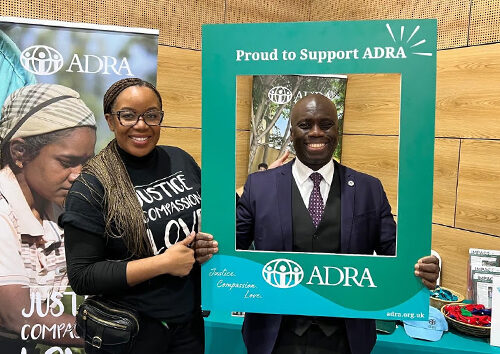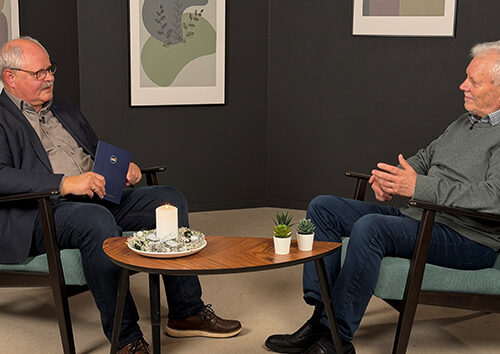27 April 2021 | St Albans, UK [David Neal, Messenger News Service]
‘Still the driving force – not holding on, not fitting in, but growing the people of God in Europe.’
A conversation about the emerging strategy of the Trans-European Division, with Pastor Raafat Kamal, president.
DN: Thanks for agreeing once again, Pastor Kamal, to connect with MESSENGER readers.
I want to talk today about the values of the Trans-European Division (TED). I note that the core of your mission statement says,
‘Our mission: make disciples of Jesus Christ who live as His loving witnesses and proclaim to all people the everlasting Gospel of the three angels’ messages in preparation for His soon return.’
Can you unpack this for us?
 RK: I think MESSENGER readers should be aware that this statement links directly to the world-church mission statement, but is reinforced by six specific values for the TED context.
RK: I think MESSENGER readers should be aware that this statement links directly to the world-church mission statement, but is reinforced by six specific values for the TED context.
First, we are committed to meeting people where they are: instead of demanding that they meet us on our terms, we build up the kingdom of God, empowered by the Holy Spirit to create new communities infused by His love. We call this transformation, the mark of our missional success here in Europe.
Second, when it comes to leadership matters, we pursue the highest ethical standards, with servant leadership that is open, transparent, accountable, principled and visionary. This is not just about who we are, but about being a living example to the society that surrounds us. It is called ethical integrity.
Third, because we are all alike born into the image of God, as followers of Christ, our spiritual DNA drives our Christ-like compassion ‘without exception’ for all people. Here’s a reality: communities around us in twenty-first-century Europe are still struggling with this. The church, our church, must not lag behind in respect of diversity, but be at the forefront in respecting, empathising and showing Christ-like love. We do not believe there should be any exceptions on the basis of colour, caste, nationality, ethnicity, race, religion, health condition, age, gender, or sexual orientation.
Fourth, because of the challenges in society I’ve just shared, the role of the church is to bring healing where there is hate and injustice. Doesn’t Micah 6:8 tell us what the Lord wants from us – to act justly, to love mercy, and to walk humbly with our God? We call it a ministry of service, helping and healing the whole person, particularly those in society who are vulnerable or rejected.
Fifth, there is something distinctive about how Seventh-day Adventists understand Scripture in relation to freedom, healing, love and hope in Jesus Christ. The Bible tells us that we belong to an ‘expectant’ community. We need to help each other strengthen this understanding.
Sixth, for the very reason that we are an expectant, waiting, community, we know we have work to do. The spreading of the Gospel in Europe remains unfinished business. This means we have no time for navel-gazing about irrelevant issues, but are called to action to spread the good news of Jesus Christ in attractive and relevant ways to our neighbourhood and beyond. In doing so, we promise to share a life in Christ that is biblically faithful, distinctly Adventist, culturally relevant and authentic to people in twenty-first-century Europe.
DN: Thank you for sharing these values; and, as you can imagine, I want to dig a little deeper on each one. What does it mean, ‘meeting people where they are, rather than on our terms’?
RK: At one time, our evangelistic mode was almost exclusively doctrinal. It was geared as, ‘Here is a message; here is the truth we have to share’ – usually delivered by a professional (pastor/evangelist). This means of communication still has a place, but is now part of a wider strategy. The focus has moved from the ‘evangelist’ to the ‘disciple’ who grows and matures relationships which make new disciples in Christ. If this is ever to become a reality, we need to increase the level of training and practise our faith. Where does the best training take place? In the local church, led by the pastor and elders. I believe that one-to-one faith sharing, guided by the power of the Holy Spirit, has the potential to create a community of disciple-makers all across the Trans-European Division, the like of which we have never seen before.
DN: And what about ethical integrity in leadership?
RK: Because of who we are, leaders from the local to the global are called to be open, accountable and transparent in their dealings with each other and with the members we serve, exhibiting servant leadership by imitating Christ, with the purpose of taking their small group, congregation, mission, conference or institution from where it is now, to where Christ wants it to be. Leadership is about seeing what can be!
DN: When it comes to diversity, do we still have much to do?
RK: Yes, and we can sometimes feel overwhelmed by how much there still is to do, both in the church and in society.
And in the church, it is challenging some of us – and, I would add, rightly so. That’s the Spirit prompting us about how we treat ‘the other’ – and the call to do better – this is the space where there are hatred and ignorance, we are to bring love, understanding and acceptance of the other.
We also need to celebrate the tapestry of people in our territory whose customs, culture and understanding, though diverse, have been woven, through the Bible and Christian history, towards an appreciation of God’s inclusive grace.
DN: Adventists and social justice have traditionally had an uncomfortable relationship. Should we engage in finding long-term solutions to alleviate pain, suffering and injustice in our neighbourhoods?
RK: ‘Learn to do right; seek justice. Defend the oppressed. Take up the cause of the fatherless; plead the case of the widow’ (Isaiah 1:17, NIV).
Ellen White reminded us in her book The Ministry of Healing (p. 143) that Christ’s method alone will give true success in reaching the people. She wrote, ‘The Saviour mingled with people as one who desired their good. He showed sympathy for them, ministered to their needs, and won their confidence. Then He bade them, “Follow Me.”’
She added on the same page that we need to come ‘close to the people by personal effort’: ‘If less time were given to sermonising, and more time were spent in personal ministry, greater results would be seen. The poor are to be relieved, the sick cared for, the sorrowing and the bereaved comforted, the ignorant instructed, the inexperienced counselled. We are to weep with those that weep, and rejoice with those that rejoice. Accompanied by the power of persuasion, the power of prayer, the power of the love of God, this work will not, cannot, be without fruit.’
You might ask, how does meeting the practical needs of our communities fit with evangelism? As an end-time prophetic movement, shouldn’t we focus on calling people to be reconciled to God through Jesus Christ, and let charities focus on the practical needs of people?
However, following Christ’s example, evangelising and meeting people’s actual needs are one. Our participation in building communities and meeting people’s practical needs is not fuelled by a missional imperative, evangelistic pragmatism, or even theological certitude, but rather simple, uncomplicated love and compassion. ‘Love has no need to justify itself.’
It should not be a PR device, a way to win favour in order to lead to conversions, a mere means to an end. It cannot be the ‘sugar on the pill or the bait on the hook’, otherwise the smell of hypocrisy will hang over our intent to bring a Christian blessing.
Meeting people’s practical needs – physical, mental, emotional and social – is a caring, loving and spiritual ministry – in other words, ‘imitating Christ’ – and this is what disciple-making is all about.
DN: What is it about our distinctive Adventist understanding of Scripture that makes us sometimes ‘inwardly focused’, and what will help us keep looking outward, rather than navel-gazing?
RK: This is the one-million-dollar question. Giving glory to God and expanding God’s kingdom must still be the chief driving force for our existence as an end-time movement, and it is always outward in focus – not holding on, not fitting in, but growing the people of God in Europe. The passion for distinctively Seventh-day Adventist mission for making God known to our family, neighbours and friends needs to impel everything done by the Trans-European Division, by its 11 unions and three attached fields, its 70 educational, publishing, and health and welfare institutions, its 1,400 congregations, its nearly 90,000 members. It is our heritage; it is our challenge; it is our opportunity.
DN: Thank you, Pastor Kamal – I look forward to continuing this conversation next month in the May edition.
This article first appeared in Messenger, Volume 126. 4. If you would like to subscribe to Messenger News Service, you can contact them on: [email protected].
tedNEWS Staff: Victor Hulbert, editor; Deana Stojković, associate editor
119 St Peter’s Street, St Albans, Herts, AL1 3EY, England
E-mail: [email protected]
Website: www.ted.adventist.org
tedNEWS is an information bulletin issued by the communication department of the Seventh-day Adventist Church in the Trans-European Division. Readers are free to republish or share this article with appropriate credit including an active hyperlink to the original article.



